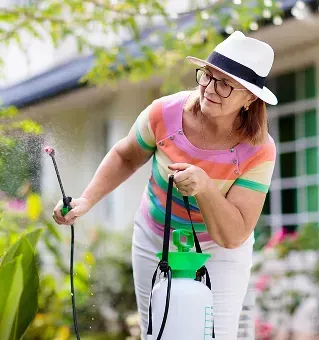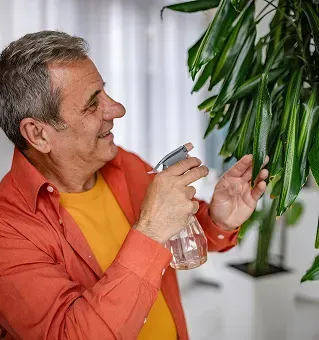Gardening season is in full swing! If you love working in your garden and around your yard and patio, it can be discouraging to see weeds, insects and small critters make their annual appearances.
To get rid of them, people sometimes rely on a variety of chemical repellents like scented foam, granules and sprays. But those can often be toxic for both animals and people in the surrounding area.
Good news! You don’t have to go scorched earth on your yard’s ecosystem.
Here are a few simple, natural solutions to keep your greenery lush and free of these nuisances without the use of toxic chemicals.
For weeds
For weeds
Salt and water to kill weeds in sidewalk, patio and driveway cracks — anywhere you’re OK with removing anything that may grow, including grass
- Mix one part table salt to two parts water in a spray bottle and spritz the weeds.
White vinegar to kill weeds
The acetic acid in white vinegar will dry out the weeds, causing them to wilt and die. Be careful not to overspray on any plants you want to keep.
- Mix one part vinegar with one part water and spray the solution on the weeds.
For insects
For insects
Soap and water to control pests such as whiteflies, beetles and aphids
- Mix no more than about a teaspoon of mild liquid soap (that doesn’t contain bleach) with one quart of water, and spray the mixture directly on the infected surfaces of the plants. It can be applied as necessary, but it’s usually recommended in the evenings or early mornings. Be careful not to soak the surrounding soil.
Fresh herbs — rosemary or sage — to keep mosquitos and flies away
- Throw some fresh sprigs on your backyard bonfire and enjoy your evening without mosquito bites. For flies, place a pot of sweet basil in a sunny spot by your patio door, to discourage flies from coming indoors.
Fresh herbs — rosemary or sage — to keep mosquitos and flies away
- Throw some fresh sprigs on your backyard bonfire and enjoy your evening without mosquito bites. For flies, place a pot of sweet basil in a sunny spot by your patio door, to discourage flies from coming indoors.
Bonus tip for indoors!
Got fruit flies? In a small bowl, add a small amount of apple cider vinegar. Cover the bowl with plastic wrap and punch a couple of small pencil-lead-sized holes in the plastic. The vinegar attracts the fruit flies, but the small opening prevents them from getting back out.
Essential oils — to repel insects and pests
- Mix a few drops of peppermint, eucalyptus or citronella with water in a spray bottle and apply it to outdoor plants where needed.
- Although this tip is for outdoor plants, please be aware that essential oils and pets — especially cats — often don’t mix. Check with your veterinarian before using essential oils around your pets.
Clove oil to do away with many bugs
Used for centuries in a variety of applications, clove oil is a fast-acting, all-natural insect killer that’s effective against mosquitoes, ants, wasps, moths and their larvae, flies, fleas, earwigs, silverfish, cockroaches and more.
- Mix a few drops with water to create a spray that can be used around windows and doors. Check with your veterinarian before using essential oils around your pets.
- As a natural repellent, insert a few cloves into lemons or limes that have been cut in half. Place the fruit on an outdoor table to keep flies and mosquitos away.
Clove oil to do away with many bugs
Used for centuries in a variety of applications, clove oil is a fast-acting, all-natural insect killer that’s effective against mosquitoes, ants, wasps, moths and their larvae, flies, fleas, earwigs, silverfish, cockroaches and more.
- Mix a few drops with water to create a spray that can be used around windows and doors. Check with your veterinarian before using essential oils around your pets.
- As a natural repellent, insert a few cloves into lemons or limes that have been cut in half. Place the fruit on an outdoor table to keep flies and mosquitos away.
Garlic spray to kill several insects
The compounds in garlic are irritating or deadly to many insects, while the oil and soap help the mixture stick to plant leaves. (Don’t apply the spray on a sunny day, as the oils can cause the foliage to burn.)
- Blend anywhere from a few cloves to two whole bulbs of garlic in a food processor with a small amount of water to create a paste.
- Let the mixture sit overnight, then strain it into a quart jar, adding 1/2 cup of vegetable oil, one teaspoon of mild liquid soap, and enough water to fill the jar.
- When you’re ready to use the spray, use one cup of the mixture with one quart of water and spray liberally on infested plants.
Vegetable oil for insects like aphids or mites
- Mix one cup of vegetable oil with one tablespoon of soap; cover and shake thoroughly; when ready to apply, add two teaspoons of the mixture to one quart of water; shake thoroughly and spray directly on the surfaces of the plants affected by the pests.
Tomato leaf spray for aphids and mites
Tomato plants are part of the nightshade family, which contain alkaloids that are fatal to many insects.
- Soak 2 cups of chopped tomato leaves in 2 cups of water overnight.
- The next day, strain the liquid and discard the leaves. Add 2 more cups of water and spray it on your plants.
For rabbits and other small critters
For rabbits and other small critters
Red pepper or cayenne pepper powder to discourage rabbits
- Sprinkling this at the base of plants can protect them from rabbits.
Coffee grounds for a variety of critters and animals
Many animals have sensitive noses, and the strong smell of the grounds makes them steer clear.
- Once they’ve been brewed, spread coffee grounds in your garden to keep critters away.
Clay cat litter to discourage small critters
Small wild animals hate the smell and texture of clay cat litter.
- Sprinkle some of this in your problem garden areas.
Household ammonia to discourage rabbits and mice
The scent of ammonia mimics the smell of urine, which rabbits can perceive as a sign of a predator marking its territory.
- Soak old strips of rags in undiluted ammonia and put them near your garden. The rags hold the scent for a while, and this should encourage critters to move on.
- If you or a neighbor have curious outdoor pets who eat everything, avoid this option as it’s harmful to pets if ingested.
Dual-purpose plants to repel rabbits, raccoons, opossums and skunks
- Planting garlic, lavender and marigolds around the perimeter of your property can help steer these animals away from your yard.
- And to further repel bunnies from your garden, consider planting some of these: more garlic, onion, rhubarb, oregano, basil, geranium and nasturtium.
If you’re trying to control garden and yard pests in an environmentally friendly way, give these tips a try!
You may also like …
3 min video








